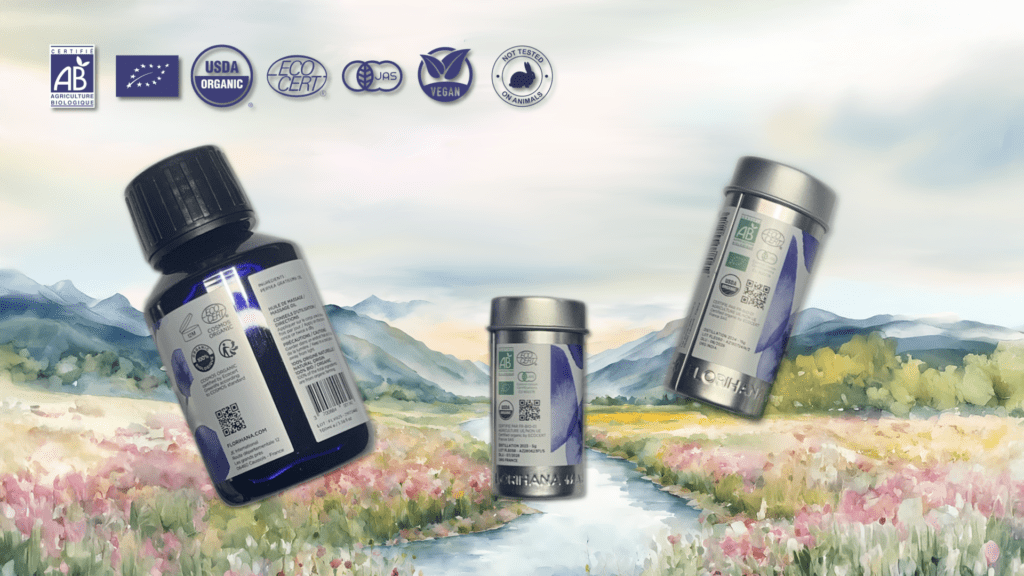Essential oils are powerful, versatile, and beloved in aromatherapy, skincare, and natural health. However, the quality of essential oils is a key factor in determining their safety and effectiveness. If you’ve ever wondered what terms like “USDA Organic” or “EcoCert” mean, or why production lot numbers and plant sourcing matter, this post will break it down for you.
Why Certifications Matter
Certifications are like a seal of trust. They tell you that the product has been tested, verified, and meets specific standards for purity, safety, and sustainability. Essential oils with proper certifications assure you that they’re free from harmful chemicals, responsibly produced, and true to what they claim to be.
USDA Organic Certification
The USDA Organic seal is awarded by the United States Department of Agriculture and ensures that the essential oil was produced according to strict organic farming standards. Here’s what it guarantees:
- No Synthetic Pesticides or Fertilizers: The plants used to produce the oil were grown without harmful chemicals.
- Non-GMO: The plants are not genetically modified.
- Sustainability: Organic farming practices must promote soil health and biodiversity.
For consumers, this means the oil is as close to its natural state as possible. If you see the USDA Organic label, you can trust that the oil is free from chemical residues and artificial additives.
EcoCert Certification
EcoCert is a global certification organization that originated in France. While it’s similar to USDA Organic, it has additional criteria tailored to sustainable development. Here’s what EcoCert ensures:
- At least 95% of the ingredients are natural or derived from natural sources.
- Minimal use of synthetic substances, with strict regulation of any additives.
- Packaging must also be eco-friendly.
EcoCert often certifies essential oils for use in cosmetics, emphasizing the importance of both the oil’s quality and its environmental impact.
JAS Certification
JAS (Japanese Agricultural Standard) certification is specific to Japan and focuses on organic agricultural products. For essential oils, JAS ensures that:
- Plants are cultivated organically without synthetic chemicals.
- Production and processing meet high hygiene and environmental standards.
If you’re sourcing essential oils in Asia, JAS certification is a sign of high-quality organic standards, comparable to USDA Organic.
Production Lot Numbers
A production lot number is a code assigned to each batch of essential oil produced. This might sound technical, but it’s crucial for:
- Traceability: The lot number links the oil to the specific production batch, allowing manufacturers to trace its origins if there are quality concerns.
- Transparency: Consumers can request testing reports or Certificates of Analysis (COA) linked to the lot number to verify the oil’s purity.
- Quality Control: Lot numbers help manufacturers maintain consistency across batches.
When buying essential oils, checking the lot number ensures that the product is fresh and traceable to its source.
Source of Plant Material
The source of the plants used in essential oils tells you a lot about their quality. Factors to consider include:
- Geographic Origin: Certain plants thrive in specific climates. For example, lavender grown in France has different properties compared to lavender grown in Bulgaria.
- Harvesting Practices: Were the plants harvested sustainably and at the right time to preserve their aromatic compounds?
- Farming Practices: Organic farming not only ensures cleaner oils but also supports biodiversity and soil health.
Some companies go a step further by working directly with farmers or cooperatives, ensuring fair wages and ethical practices. Always look for brands that emphasize transparency about their sourcing.
Why These Factors Are Essential
Combining certifications, production lot details, and sourcing practices ensures that essential oils are:
- Safe for Use: Free from harmful contaminants or adulterants.
- Environmentally Friendly: Produced in ways that protect the planet.
- Consistent in Quality: You’ll get the same high-quality oil every time.
How to Choose Certified Essential Oils
When shopping for essential oils, look for the following:
- Certification Labels: USDA Organic, EcoCert, or JAS seals on the bottle or packaging.
- Detailed Product Information: The bottle should list the plant’s botanical name, country of origin, and lot number.
- Reputable Brands: Choose companies with transparent sourcing and lab-testing policies.
Final Thoughts
Understanding certifications and quality indicators can empower you to make informed choices about essential oils. Whether you’re a beginner or a seasoned enthusiast, look beyond marketing claims and focus on the details that matter: certification, traceability, and ethical sourcing.
High-quality essential oils are more than just a luxury—they’re a commitment to your well-being and the environment. Always do your research, and don’t hesitate to ask brands for more information when in doubt.

